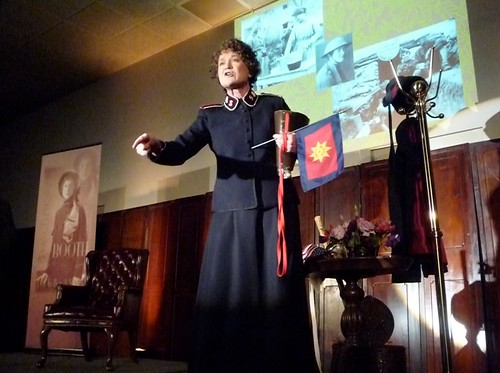The Salvation Army’s Markle Evangeline Residence for Women, which celebrated its 82nd anniversary yesterday, is one of the last of the city’s “girls’ homes,” and an odd bird: incoming tenants pay $1,650 to $1,735 a month for a single room that comes with perks like weekly maid service, two meals a day, and access to a rooftop lounge with sweeping views of the Manhattan skyline. At the same time, they’re forbidden from having alcohol in their rooms, or bringing men back to them, and the building is run by staff members with titles like major and lieutenant colonel.
General Evangeline Cory Booth, daughter of the Salvation Army’s British-born founder, envisioned the residence as a safe haven for young single women of modest means. When the cornerstone of the 17-story art deco building at 123 West 13th Street was laid in 1930, one of its first residents beamed, “already it has the atmosphere of a real home. There are 325 girls overjoyed to be living here.”
But as the Markle observed its anniversary yesterday in a basement space that once held a swimming pool and is now used as a dining room, not everyone was so overjoyed. Last month, Marion Jeeves jumped from the window of her small apartment and died at the age of 57. Friends said she was a poet who had been depressed over long periods of unemployment and financial difficulties.
Others have left the building under less tragic but still bitter circumstances, complaining that the residence no longer caters to those of modest means. On Feb. 14, Martine Mallary, a 60-year-old graphic designer and photographer, was ordered to vacate her room, a cramped 125-square-foot space for which she paid $1,530 per month.
After 26 years in Salvation Army residences, the order to leave by March 31 took her by such surprise, and induced such panic at the possibility of homelessness, that she sought the help of local politicians, who were able to buy her more time. She moved out of the Markle earlier this month and now lives in Washington Heights.
“It came out of the blue,” she said of the termination notice. “And I’m still in shock. It feels like such a betrayal — not just of me but of the values of the Salvation Army.”
Before moving to the Markle, Ms. Mallary had lived in the Salvation Army’s Parkside Evangeline residence, a girls’ home in Gramercy Park charmingly described in a Times profile as “a strange little island unto itself, a striking anomaly in the town that inspired ‘Sex and the City.'” Indeed, one resident told The Times the atmosphere was more “Girl, Interrupted,” thanks in part to rules against everything from microwaves to visitors after 11 p.m. Monthly fees were just $844 at the Parkside in 2005.
In 2006, the Salvation Army announced that it was closing the building along with its Ten Eyck-Troughton Residence on East 39th Street, claiming they were too expensive to maintain. Residents, who as early as 1987 had complained that they were being harassed and pushed out, sued to stay in the homes, but a Supreme Court judge ruled that because their primary use was charitable, they were not subject to rent-stabilization laws. The Parkside was closed in 2008: it sold for $60 million so that its 300 rooms could be converted into 17 luxury condos. The Salvation Army said that proceeds from the sale would fund its charitable operations.
Jim Provost, a lawyer at Manhattan Legal Services, which represented the Parkside tenants, said the religious non-profit had the law on its side. “Since no rent regulation applies to them, they can do anything they want except discrimination and they can’t retaliate against a tenant for making a complaint about a housing situation,” he said.
The Markle has month-to-month occupancy agreements with its tenants rather than long-term leases. New applicants must provide three months’ fees in advance, plus a $200 non-refundable registration fee. Applicants must also be between the ages of 18 and 50, and provide proof they are either students or employed in New York.
Mr. Provost believed that even if it was legally acceptable, Ms. Mallary’s termination at the Markle raised ethical questions. “These residences are for women of modest means,” he said. “But you have to show a certain amount of income to move in there. They’re not based on a sliding scale of income.”
When tenants of the Parkside and Ten Eyck lost their case against the Salvation Army in 2007, State Senator Liz Krueger told The Times, “Bad behavior by some landlords is unfortunately not new to me. The point here is the Salvation Army, the second-largest nonprofit in the country, that puts Santa Claus out on the street at Christmas, is not the group you expect to take the position, ‘This is just a real estate deal; these women have to go.’ ”
Ms. Mallary also sought help from politicians, and got it. With the assistance of the offices of City Council Speaker Christine Quinn, Assembly Member Deborah Glick and Congressman Jerrold Nadler, she was able to delay her departure from the Markle another 30 days.
Ms. Mallary claimed the Salvation Army gave her no reason for her termination. But, she said, a member of Speaker Quinn’s staff told her that a lawyer representing the organization, Howard Burns (who did not return The Local’s request for comment) cited erratic behavior, intimidation of staff and unauthorized modifications to her apartment. Ms. Mallary said the charges were “trumped up,” though she admitted to shouting at a pair of maintenance workers when they failed to show up for scheduled repairs. (She later apologized, she said.)
She speculated that she was targeted because she complained about a ten percent increase in monthly fees as well as a new maintenance inspection policy: residents were to be told to expect room visits within a certain week rather than an exact day. She went so far as to have Manhattan Legal Services fax a letter to the Markle’s on-site administrator, Major William T. Bender, and his superior on behalf of anonymous tenants claiming the inspections were illegal.
Major Bender declined to comment on the matter. Requests to speak to his superior, Lt. Col. Guy D. Klemanski, were referred to Major Evan P. Hickman, general secretary of the Salvation Army’s Greater New York Division and his second-in-command at the pseudo-military organization.
Major Hickman also declined to comment on Ms. Mallary’s situation and said he couldn’t speak to the sales of the Parkside and the Ten Eyck since he hadn’t arrived in New York at the time, but he insisted, “The mission of the Salvation Army is to preach and teach the good news of the gospel of Jesus Christ and to meet needs without discrimination. We’re not real estate brokers trying to make money off of real estate transactions.”
In reference to recent turnover at the Markle, Major Hickman said, “People move in and move out and some people have to be forced out. If someone can’t afford the Markle, we have homeless shelters we operate.”
“It’s affordable for business and professional people,” he said.
Ms. Mallary isn’t the only recent tenant who has complained about a steady increase in monthly fees, as well as other changes. On Yelp, a reviewer claiming to be a former tenant and using the name Hipstergal J. complained that the Markle’s in-house salon was closed “even though many residents found it convenient and it was CHEAP, CHEAP, CHEAP.” She wrote, “The managers are unfriendly. Sometimes MEAN and aloof. They have a ‘if you don’t like it, it’s too bad attitude.'” The review, which also complained of run-down facilities, insects, a lack of air conditioning, and intimidation of guests, finished: “I now have a studio apartment in Queens for $1,100 and I’m glad to be out of there!”
Tomoko Singleton, who was a Markle resident for nearly a decade before relocating to Harlem earlier this year, also complained of a love-it-or-leave-it attitude. She said that last year, she complained that staff members were peeking into her room while she was away. “[Major Bender] told me I had flipped out and if his [surveillance] camera didn’t show anyone going into my room, he would send me a 30-day notice,” said the 53-year-old, who holds an administrative job in the city. “He said I was always complaining and wasn’t happy so I should leave. I told him I knew my rights and said it’s a free country.”
Mary K. Blasi said the fee for her small apartment increased almost every year by at least seven percent. At the age of 53, she needed help from her mother to pay her monthly fee of $1,315. “I couldn’t afford to live there,” she said. She left the building last June after her $12-an-hour job as a teacher’s aide at an Upper East Side day-care center was downsized to a position paying $8 per hour.
Ms. Blasi, who now lives with her mother in Westchester, said she had fond memories of the residence. “The Markle was a nice place to live,” she said. “I made friends from all over the world and when I come back to visit, there’s always a warm welcome.”
Indeed, other former Markle residents have memories that are more in keeping with a promotional video, made for the Markle’s 80th anniversary, in which tenants and staffers repeatedly use words like “home” and “family,” and praise everything from the camaraderie to the cafeteria food. Last year, Madelyn O. Biggs, a tenant from 1941 through 1945, donated $25,000 to open a Markle endowment fund. She also offered a bequest of most of the proceeds from the sale of her apartment when she sells it or dies.
Mrs. Biggs, an 87-year-old widow on the Upper West Side, remembers a “loving and caring” environment where she could see the Empire State Building from her corner room. She said she didn’t think older residents were being forced to leave the Markle. “They don’t kick them out,” she said.
Speaking of Gen. Evangeline Cory Booth, a lifelong single woman and the Salvation Army’s first female commander, Ms. Biggs said, “She used the most expensive materials, the finest marbles and gorgeous grill work. And she was criticized for spending so much money.”
Sitting in the dining room during one of her last days at the Markle, Ms. Mallary also told stories of the residence’s founder. It was said she drove around the Bowery in a horse-drawn wagon, picking up drunks in order to feed them coffee and donuts.
As Ms. Mallary picked at her food, tenants came by carrying trays, wishing her good luck and saying they’d miss her in low voices. “Martine — she don’t bother nobody,” said a resident in her late 60s.
The woman, who asked not to be named, described her modest room. “It’s so small I have to walk in sidewise,” she joked. “I’d leave in a minute if I could.”








